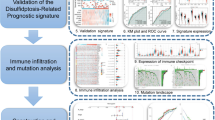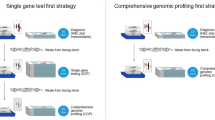Abstract
Background
Lung cancer, especially non-small cell lung cancer (NSCLC), is the leading cause of cancer-related deaths all over the world. Studies have indicated that molecular biomarkers, including genetic variants, may provide additional values for the targeted treatments and clinical outcomes of NSCLC patients. To better understand the effects of molecular biomarkers on the treatment of NSCLC, we conducted a genome-wide analysis to investigate the prognostic implications of genetic variants in early-stage NSCLC patients with surgery.
Methods
A genome wide scan of 906,703 single-nucleotide polymorphisms (SNPs) was conducted in a cohort with 365 early-stage NSCLC patients with surgery, followed by a fast-track replication in another independent cohort of 327 NSCLC patients from Nanjing, China. Cox models were used to screen and validate significant SNPs associated with the overall survival of early-stage NSCLC patients.
Results
We found that rs10023113 in calcium/calmodulin-dependent protein kinase II delta (CAMK2D) was consistently associated with survival of early-stage NSCLC in the GWAS scan and the replication cohort [GWAS scan: hazard ratio (HR) 2.84; 95 % confidence interval (CI) 1.90–4.23, P = 1.29 × 10−6; replication cohort: HR 2.19, 95 % CI 1.15–4.21, P = 1.80 × 10−2]. When combining all the patients, the results showed that the variant allele of rs10023113 was significantly associated with poor prognosis of early-stage NSCLC with P value of 3.40 × 10−7 (HR 2.30, 95 % CI 1.67–3.17).
Conclusions
These findings suggest that CAMK2D rs10023113 may be a potentially prognostic marker for overall survival of early-stage NSCLC patients in Chinese population.


Similar content being viewed by others
References
Parkin DM, Bray F, Ferlay J, Pisani P. Global cancer statistics, 2002. CA Cancer J Clin. 2005;55:74-108.
Hoffman PC, Mauer AM, Vokes EE. Lung cancer. Lancet. 2000; 355:479-485.
Chen HY, Yu SL, Chen CH, et al. A five-gene signature and clinical outcome in non-small-cell lung cancer. N Engl J Med. 2007;356:11-20.
Shedden K, Taylor JM, Enkemann SA, et al. Gene expression-based survival prediction in lung adenocarcinoma: a multi-site, blinded validation study. Nat Med. 2008;14:822-7.
Gurubhagavatula S, Liu G, Park S, et al. XPD and XRCC1 genetic polymorphisms are prognostic factors in advanced non-small-cell lung cancer patients treated with platinum chemotherapy. J Clin Oncol. 2004;22:2594-601.
Matakidou A, el Galta R, Webb EL, et al. Genetic variation in the DNA repair genes is predictive of outcome in lung cancer. Hum Mol Genet. 2007;16:2333-40.
Yin J, Lu C, Gu J, et al. Common genetic variants in cell cycle pathway are associated with survival in stage III-IV non-small-cell lung cancer. Carcinogenesis. 2011;32:1867-71.
Wu X, Lu C, Ye Y, et al. Germline genetic variations in drug action pathways predict clinical outcomes in advanced lung cancer treated with platinum-based chemotherapy. Pharmacogenet Genomics. 2008;18:955-65.
Shen H, Jin G. Human genome epidemiology, progress and future. J Biomed Res. 2013;27:167-9.
Sato Y, Yamamoto N, Kunitoh H, et al. Genome-wide association study on overall survival of advanced non-small cell lung cancer patients treated with carboplatin and paclitaxel. J Thorac Oncol. 2011;6:132-8.
Wu X, Ye Y, Rosell R, et al. Genome-wide association study of survival in non-small cell lung cancer patients receiving platinum-based chemotherapy. J Natl Cancer Inst. 2011;103:817-25.
Hu L, Wu C, Zhao X, et al. Genome-wide association study of prognosis in advanced non-small cell lung cancer patients receiving platinum-based chemotherapy. Clin Cancer Res. 2012;18:5507-14.
Lee Y, Yoon KA, Joo J, Lee D, Bae K, Han JY, Lee JS. Prognostic implications of genetic variants in advanced non-small cell lung cancer: a genome-wide association study. Carcinogenesis. 2013;34:307-13.
Hu Z, Wu C, Shi Y, et al. A genome-wide association study identifies two new lung cancer susceptibility loci at 13q12.12 and 22q12.2 in Han Chinese. Nat Genet. 2011;43:792-6.
Purcell S, Neale B, Todd-Brown K, et al. PLINK: a tool set for whole-genome association and population-based linkage analyses. Am J Hum Genet. 2007;81:559-75.
Li Y, Willer C, Sanna S, Abecasis G. Genotype imputation. Annu Rev Genomics Hum Genet. 2009;10:387-406.
Cai H, Liu D, Garcia JG. CaM Kinase II-dependent pathophysiological signalling in endothelial cells. Cardiovasc Res. 2008;77:30-4.
Borbiev T, Verin AD, Shi S, Liu F, Garcia JG. Regulation of endothelial cell barrier function by calcium/calmodulin-dependent protein kinase II. Am J Physiol Lung Cell Mol Physiol. 2001;280:L983-90.
Silva AJ, Paylor R, Wehner JM, Tonegawa S. Impaired spatial learning in alpha-calcium-calmodulin kinase II mutant mice. Science. 1992;257:206-11.
Griffith LC. Calcium/calmodulin-dependent protein kinase II: an unforgettable kinase. J Neurosci. 2004; 24: 8391-3.
Zhang T, Brown JH. Role of Ca2+/calmodulin-dependent protein kinase II in cardiac hypertrophy and heart failure. Cardiovasc Res. 2004;63:476-86.
Slusarski DC, Yang-Snyder J, Busa WB, Moon RT. Modulation of embryonic intracellular Ca2 + signaling by Wnt-5A. Dev Biol. 1997;182:114-20.
Kuhl M, Sheldahl LC, Malbon CC, Moon RT. Ca2+;/calmodulin-dependent protein kinase II is stimulated by Wnt and Frizzled homologs and promotes ventral cell fates in Xenopus. J Biol Chem. 2000;275:12701-11.
Pukrop T, Klemm F, Hagemann T, et al. Wnt 5a signaling is critical for macrophage-induced invasion of breast cancer cell lines. Proc Natl Acad Sci USA. 2006;103:5454-9.
Dissanayake SK, Wade M, Johnson CE, et al. The Wnt5A/protein kinase C pathway mediates motility in melanoma cells via the inhibition of metastasis suppressors and initiation of an epithelial to mesenchymal transition. J Biol Chem. 2007;282:17259-71.
Nomura K, Takeuchi Y, Yamaguchi S, Okamura H, Fukunaga K. Involvement of calcium/calmodulin-dependent protein kinase II in the induction of mPer1. J Neurosci Res. 2003;72:384-92.
Gery S, Komatsu N, Kawamata N, et al. Epigenetic silencing of the candidate tumor suppressor gene Per1 in non-small cell lung cancer. Clin Cancer Res. 2007;13:1399-404.
Huang YT, Heist RS, Chirieac LR, et al. Genome-wide analysis of survival in early-stage non-small-cell lung cancer. J Clin Oncol. 2009;27:2660-7.
Source of Funding
This work is funded by the National Natural Science Foundation of China (81270044 and 81230067), National Outstanding Youth Science Foundation of China (81225020), Science Foundation for Distinguished Young Scholars of Jiangsu (BK2012042), Key Grant of Natural Science Foundation of Jiangsu Higher Education Institutions (11KJA330001), Natural Science Foundation of Jiangsu Province (BK2012042), New Century Excellent Talents in University (NCET-10-0178), Changjiang Scholars and Innovative Research Team in University (IRT0631), National Program for Support of Top-notch Young Professionals from the Organization Department of the CPC Central Committee, Jiangsu Province Clinical Science and Technology Projects (BL2012008), Collaborative Innovation Center For Cancer Personalized Medicine in Jiangsu Province and Priority Academic Program Development of Jiangsu Higher Education Institutions (Public Health and Preventive Medicine).
Disclosure
The authors declare no commercial interest and financial or material support.
Author information
Authors and Affiliations
Corresponding authors
Additional information
Shaowen Tang, Yun Pan and Yi Wang contributed equally to this work.
Electronic supplementary material
Below is the link to the electronic supplementary material.
Rights and permissions
About this article
Cite this article
Tang, S., Pan, Y., Wang, Y. et al. Genome-wide Association Study of Survival in Early-stage Non-Small Cell Lung Cancer. Ann Surg Oncol 22, 630–635 (2015). https://doi.org/10.1245/s10434-014-3983-0
Received:
Published:
Issue Date:
DOI: https://doi.org/10.1245/s10434-014-3983-0




